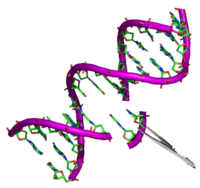
Photo from wikipedia
Background: In this study, we explored the factors that motivate food choice, and evaluated the psychometric properties and demographic correlates of the Eating Motivation (EATMOT) questionnaire in adults in the… Click to show full abstract
Background: In this study, we explored the factors that motivate food choice, and evaluated the psychometric properties and demographic correlates of the Eating Motivation (EATMOT) questionnaire in adults in the United States (US). Methods: This cross-sectional survey involved 905 adults in 6 sites across the US. The EATMOT questionnaire measures participants' self-reported motivations for food selection, demographic, and anthropometric data. Analyses included exploratory and confirmatory factor analyses, correlations, Welch's t-tests, and logistic regressions. Results: We established a 3-factor model (health-related, emotional, and environmental/political motivations) as the best fit to the data (CFI = .983, RMSEA = .049, SRMR = .054). Gender differences were found within the 3 factors, as well as in the intercorrelations between factors. Higher levels of health-related motivations (B = .10, SE = .04, OR = 1.11 (95% CI: 1.03, 1.19), p = .006) were associated with increased reports of weight loss dieting, whereas higher levels of environmental/political motivations (B = -.09, SE = .04, OR = 0.91, p = .02) were associated with fewer reports of weight-loss dieting. Conclusion: An abbreviated version of the EATMOT scale is appropriate for use in a US sample and identifies 3 categories of factors that impact dietary choices. These factors may be important in building interventions to improve diets.
Journal Title: American journal of health behavior
Year Published: 2022
Link to full text (if available)
Share on Social Media: Sign Up to like & get
recommendations!